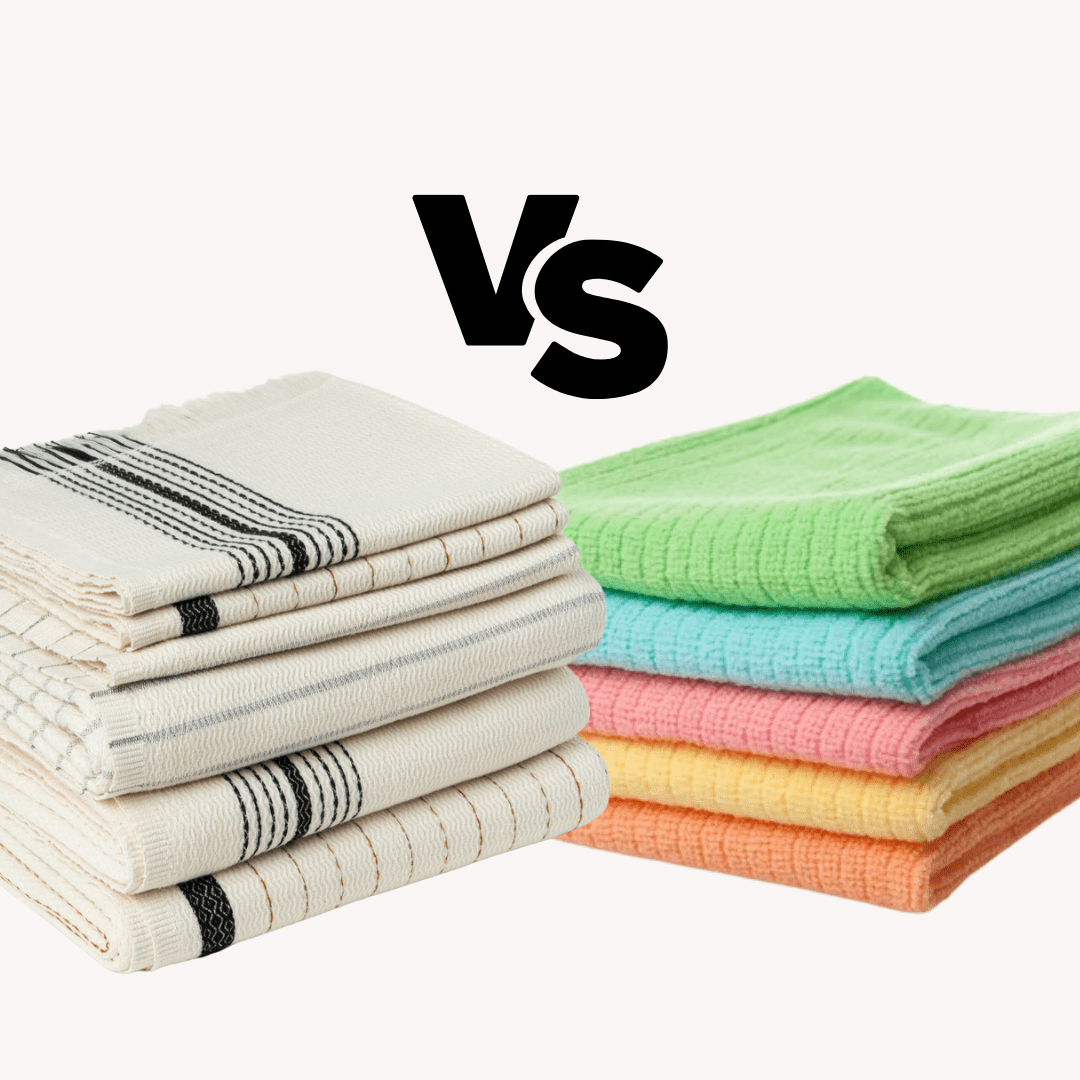When selecting the ideal towel for your home, the material is as important as the size and color. Cotton and microfiber are two popular options, each with unique benefits. Whether you're drying off after a shower or cleaning gym equipment, knowing the differences can help you choose the right towel for your needs. In this guide, we'll dive deep into what sets these materials apart, from absorbency and durability to environmental impact and care requirements.
Understanding Cotton and Microfiber: The Basics
Cotton towels are valued for their softness and absorbency, made from the fluffy fibers of the cotton plant. They have been used for centuries due to their plush feel and drying effectiveness. In contrast, microfiber towels, made from a blend of polyester and polyamide, feature ultra-fine threads that allow for quick water absorption and efficient dirt and dust pickup.
The history of towel materials shows cotton being used as far back as ancient Egypt, while microfiber was developed in the late 20th century with the aim of improving upon both the functionality and environmental impact of traditional textiles. This newer technology boasts impressive results in both consumer and industrial markets, reshaping expectations for performance in cleanliness and maintenance.
Absorbency Face-Off: Cotton vs. Microfiber
Absorbency is perhaps the most crucial factor to consider when selecting a towel. Cotton is naturally absorbent, soaking up water with its porous fibers and leaving you dry and cozy. They can hold up to 25 times their weight in water, making them superb for high-moisture tasks.
Microfiber, although synthetic, has a unique absorbency. Its fibers act like a squeegee, drawing in moisture and allowing surfaces to dry quickly with less streaking. While it absorbs up to seven times its weight in water, which is less than cotton, it compensates with faster drying and more effective cleaning for tasks like polishing surfaces or cleaning glass.
Durability and Longevity: Which Fabric Stands the Test of Time?
When investing in new towels, durability is a key consideration. Cotton towels are known for their long-lasting nature. With each wash, cotton fibers actually tend to become fluffier and more absorbent, though they can take a bit longer to dry. This natural material can withstand high temperatures and vigorous washing cycles, making it ideal for busy households and frequent use.
Microfiber towels are also durable and less prone to shrinking or fading than cotton. It's important to wash them carefully, avoiding fabric softeners and bleach to protect the microfibers. Their resistance to wear makes them popular in commercial settings like hotels. Both microfiber and cotton towels can last for years if properly maintained.
Drying Speed: Quick-Dry Microfiber vs. Traditional Cotton
The quick-drying feature of towels is not just about convenience; it's also crucial for maintaining hygiene. Towels that dry faster are less likely to develop mildew and odors. Microfiber towels excel in this area, with synthetic fibers that allow them to dry significantly faster than cotton. This makes them an excellent option for travel or gym use, where quick drying is beneficial and often necessary.
On the other hand, traditional cotton towels typically take longer to dry but offer a plush, cozy feel that many desire after a bath or shower. While their slower drying time might be seen as a drawback in humid climates or during the rainy season, their superior softness and comfort can make this a worthwhile trade-off. However, not all cotton towels are created equal. Turkish cotton towels, known for their long fibers, are surprisingly lightweight and can dry more quickly than other cotton varieties. This unique quality makes them suitable even in less ideal drying conditions, such as in damp or humid environments.
Softness and Comfort: Comparing Texture and Feel
When it comes to personal comfort, the texture of a towel is crucial. Cotton towels, particularly high-quality varieties like Egyptian and Turkish cotton, are celebrated for their softness, becoming even softer with each wash. This makes them a popular choice for personal use, especially for those with sensitive skin.
Microfiber towels, while initially less soft, have improved in texture and can feel almost as plush as cotton. However, some find microfiber clingy or too synthetic on damp skin. Therefore, microfiber is often preferred for its cleaning efficiency and low-lint properties rather than for comfort.
Environmental Impact: Eco-Friendliness of Cotton and Microfiber
The environmental impact of towel materials is vital for eco-conscious consumers. Cotton, while natural, often requires significant water and pesticides unless grown organically, making conventional cotton towels resource-intensive. Organic cotton offers a more sustainable option.
In contrast, microfiber is a synthetic material derived from petroleum, with energy-intensive production. It can release microplastics during washing, contributing to ocean pollution. Although advancements and proper washing can reduce some issues, they are still important to consider.
Versatility: Different Uses for Cotton and Microfiber Towels
When considering versatility, cotton and microfiber towels each have unique advantages. Cotton towels are ideal for home use, such as in bathrooms and kitchens, due to their high absorbency and softness, making them perfect for drying off after baths or for baby care.
Microfiber towels, on the other hand, excel in sports and automotive applications. They are lightweight, quick-drying, and lint-free, making them great for travel, fitness activities, and various cleaning tasks.
Both materials can be specialized for specific uses, like ultra-absorbent gym towels or luxurious Turkish cotton beach towels. This range ensures there's a suitable towel for every need, whether for practical cleaning or comfort.
Cost Comparison: Initial Investment and Long-Term Value
When comparing the cost of cotton and microfiber towels, it's essential to consider both initial prices and long-term value. Cotton towels usually have a higher upfront cost, especially for high-quality or organic options, but they are durable and maintain their effectiveness after many washes. This makes them a better long-term investment. Affordable cotton options are also available.
Microfiber towels are generally cheaper initially and offer savings in maintenance and energy costs due to their quick-drying properties and lower replacement needs. They work well for frequent use, like in gyms or cleaning situations. However, they require careful handling to avoid damage from heat and chemicals.
Maintenance and Care: Keeping Your Towels in Top Condition
Proper maintenance is vital for extending the lifespan of your towels, whether cotton or microfiber.
Cotton Towels:
Wash cotton towels in warm water with similar colors and tumble dry on low heat to keep them soft. Avoid fabric softeners and bleach, as they can damage the fibers and reduce absorbency.
Microfiber Towels:
Wash microfiber towels separately to prevent lint transfer and refrain from using fabric softener or bleach, which can clog the microfibers. Air-dry or tumble dry on low heat to protect the synthetic fibers.
Making the Right Choice: Factors to Consider for Your Lifestyle
When choosing between cotton and microfiber towels, consider your lifestyle needs. If you require a towel that dries quickly for the gym or travel, microfiber is a better option. For those prioritizing comfort and skin sensitivity, cotton is preferable.
Also, take into account your climate. In humid areas, microfiber helps prevent mildew, while cotton offers warmth in colder environments. Finally, think about the environmental impact: cotton uses more water, whereas microfiber can contribute to microplastic pollution.
Conclusion:
When you weigh the benefits of cotton and microfiber towels, Turkish cotton stands out for its luxury, performance, and durability. At The Loomia, we proudly offer a selection of Turkish cotton towels that combine traditional craftsmanship with contemporary design to bring you the ultimate in bathing luxury.
Ready to transform your daily routine into a spa-like experience with our premium Turkish cotton towels? Visit our store now to explore our collection and find the perfect towels to pamper yourself with everyday luxury.


Share:
Revealing All: Our Toughest Year So Far
Towel Hacks: Creative Uses for Old Towels in Your Home